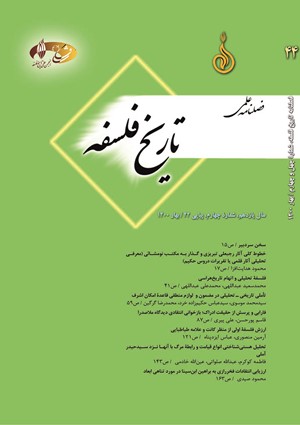فلسفة تحلیلی و اتهام تاريخهراسي
محورهای موضوعی : ریشهشناسی مکاتب و آراء فلسفی در ادوار قدیم و جدیدمحمد سعید عبداللهی 1 , محمدعلی عبداللهی 2
1 - دانشجوی کارشناسی ارشد فلسفه دانشگاه تهران، پردیس فارابی، قم، ایران
2 - دانشیار گروه فلسفه دانشگاه تهران، پردیس فارابی، قم، ایران
کلید واژه: فلسفة تحلیلیتاریخ فلسفهفلسفه قارهيیمتافیزیکتاريخهراسي,
چکیده مقاله :
بنا بر نظر برخی از فیلسوفان، بیاعتنایی به مسائل تاریخی یکی از ویژگیهای فلسفة تحلیلی در مقایسه با دیگر مکاتب فلسفی است. بهمين دليل همواره اتهامِ بیتوجهی به موضوعات تاریخی (تاريخهراسي) را به فیلسوفان تحلیلی نسبت میدهند و آنها را سرزنش میکنند. در طرح و بیان این ادعا، فیلسوفان قارهيی و سنتگرا با یکدیگر همداستانند. اما آیا منتقدان فلسفة تحلیلی براهین کافی و قانعکنندهيي برای اين اتهام دارند؟ یا اینکه بیتوجهی به تاریخ، ادعایی بیپایه است که برخاسته از تلقی نادرست و شناخت ناکافی از این نهضت فلسفی است؟ در این مقاله درصدديم از سویی ادعا، استدلالها و شواهد منتقدان را برای عدم آگاهیِ تاریخی در فلسفة تحلیلی روشن کنیم و از سوي ديگر، توجه و دقت در نحوة نگرش فیلسوفان تحلیلی به تاریخ فلسفه و دلایل آنها را بیان نماييم. تأکید ما بر اینست که اولاً، باید میان تاریخانگاری ذاتی، تاریخانگاری ابزاری و تاریخانگاری ضعیف تمایز قائل شد. فیلسوفان تحلیلی شاید با تاریخانگاری ذاتی مخالف باشند ولی نوعی تاریخانگاری ضعیف را میپذیرند. ثانیاً، تأکید بر تمایز تاریخ مسائل فلسفی از تاریخ فلسفه نباید بمعنای تاريخهراسي یا همسانسازی گذشته و حال تلقی شود.
According to some philosophers, not heeding historicity is one of the characteristics of analytic philosophy in comparison to other philosophical schools. That is why analytic philosophers are always being accused of ignoring historicity and blamed for this charge. Continental and traditionalist philosophers are unanimous in this regard. However, the question is whether the critics of analytic philosophy can support this accusation with sufficient and convincing arguments, or whether not taking heed of history is a baseless claim rooted in an incorrect perception and insufficient knowledge of this philosophical movement. This paper is intended to explain the critic’s claims, arguments, and proofs as to historical ignorance in analytic philosophy, on the one hand, and to describe the attention and accuracy invested in analytic philosophers’ view of history of philosophy and their arguments. The authors emphasize that, firstly, one must distinguish between essential, instrumental, and weak types of historicity. Analytic philosophers might reject essential historicity but accept a kind of weak historicity. Secondly, an emphasis on the distinction of the history of philosophical problems from history of philosophy should not be understood in the sense of anti-historicity or equating the past and presence.
دامت، مایکل (1391) خاستگاههای فلسفه تحلیلی، ترجمه عبدالله نیکسیرت، تهران: حکمت.
کانت، ایمانوئل (1388) تمهیدات، ترجمه غلامعلی حداد عادل، تهران: مرکز نشر دانشگاهی.
کریچلی، سایمون (1387) فلسفه قارهيی، ترجمه خشایار دیهیمی، تهران: نشر ماهی.
ودبرگ، اندرس (1394) تاریخ فلسفه تحلیلی، ترجمه جلال پیکانی و بیتالله ندرلو، تهران: حکمت.
Ayer, A. J. (1952). Language, truth and logic (Znd ed.) Dover Poblications.
(1978). Analytical philosophy and the history of philosophy. M. Ayers, J. Ree & A. Westoby. Philosophy and Its Past. Brighton: Harvester. pp.42–66.
Broad, C. D. (1944). Five types of ethical theory. London: Routledge & Kegan Paul.
Glock, H-J. (2008). What is analytic philosophy?. Cambridge University Press.
Hacker, P. M. S. (1998). Analytic Philosophy: What, whence, and whither?. in A. Biletzki & A. Mater (Eds.). The Story of analytic philosophy, plot and heroes. London: Routledge.
Kruger, L. (1984). Why do we study the history of philosophy?. in R. Rorty, B. Schneewind & Q. Skinner (Eds.). Philosophy in history. Cambridge university press.
Kenny, A. (2005). The philosopher’s history and the history of philosophy. in Sorell and Rogers (eds.). Analytic philosophy and history of philosophy. Oxford university press. pp.15–24.
MacIntyre, A. (1984). The relation of rhilosophy to its past. in R. Rorty, B. Schneewind & Q. Skinner (Eds.). Philosophy in history. Cambridge university press. pp. 31–40.
Monk, R. (1991). Ludwig Wittgenstein: the duty of genius. London: Penguin books.
Mulhall, S. (2002). Post-analytic philosophy. in J. Baggini & J. Stangroom (eds.) New British philosophy: the interviews. London: Routledge. pp.237-252.
Passmore, J. (1917). 100 years of philosophy. London: Duckworth.
Rorty, R. (1986). Pragmatism, davidson and truth. in E. Lepore (ed.), Truth and Interpretation: perspectives on the Philosophy of Donald Davidson. Oxford: Blackwell. pp.333–55.
Rorty, R (1979). Philosophy and the mirror of nature. Princeton university press.
Russell, B. (1900). The philosophy of Young Leibniz, with a new introduction by J. G. Slater. London: Routledge.
Searle, J. (1996). Contemporary philosophy in the United States. in N. Bunnin & E. Tsui-James (eds.). The Blackwell companion to philosophy. Blackwell.
Schopenhauer, A. (2007). Parerga and parilepomena: a collection of Philosophical essays. Oxford University Press.
Taylor, C. (1984). Issues in philosophical historiography. in R. Rorty, B. Schneewind & Q. Skinner (eds.), Philosophy and its History. Cambridge university press. pp.17–30.
Wilshire, B. (2002). Fashionable Nihilism: a Critique of analytic philosophy. State University of New York Press.
Wittgenstein, L. (1922). Tractatus logico-philosophicus. London: Routledge & Kegan Paul.


